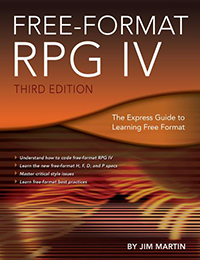 Traditional fixed-format RPG programmers everywhere are embracing the increased productivity, better readability, and easier program maintenance that comes with the free-format style of programming in RPG IV. This book--both learning tool and handy reference guide--provides the information you need to learn this powerful way of coding.
Traditional fixed-format RPG programmers everywhere are embracing the increased productivity, better readability, and easier program maintenance that comes with the free-format style of programming in RPG IV. This book--both learning tool and handy reference guide--provides the information you need to learn this powerful way of coding.
Although free-format information is available in IBM manuals, it is mixed in with everything else, requiring hours of tedious research to track down the information you need. With this book, your search is over. Free-Format RPG IV is the "one-stop" resource that will save you time and frustration. You'll find everything you need to know to write RPG IV in the free-format style. Jim Martin not only teaches rules and syntax but also explains how this modern style of coding can improve overall programmer productivity--from initial development through maintenance. He methodically covers the "how to" involved in free-format RPG IV, including many style issues, such as named indicators and built-in functions. He also addresses input and output, program flow, data manipulation, and math operations--plus prototyping and APIs.
Free-format RPG now encompasses nearly all functional aspects of the language, and this Third Edition of Free-Format RPG IV brings you up-to-date on all the latest features. You'll find a chapter devoted to the new free-format H (Control), F (File definition), D (Definition), and P (Subprocedure) specifications. And throughout the book, the programming examples have been updated so you can see the new specifications in action.
Free format is the future of the RPG language, and knowing this method is quickly becoming a "must" for all RPG programmers. This book gives you the guidance you need to upgrade your programming skills and bring your RPG programs into the 21st century.
Upon completion of this book, you will be able to:
- Understand how to code free-format RPG IV
- Learn the new free-format H, F, D, and P specs
- Master critical style issues
- Learn free-format best practices



















